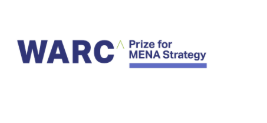 Insights from WARC’s Prize for MENA Strategy 2020
Insights from WARC’s Prize for MENA Strategy 2020
WARC, the global authority on marketing effectiveness, has today released the 2020 MENA Strategy Report, outlining insights and successful marketing trends following an analysis of the results of this year’s WARC Prize for MENA Strategy, an annual case study competition that rewards the region’s smartest strategic thinking.
Lucy Aitken, Managing Editor, Case Studies, WARC, says: “As certain MENA markets are already enduring their second wave of COVID-19 and several continue to be buffeted by economic recession, identifying new strategies for growth is vital for brands.
“In this report, we’ve identified new approaches that this year’s winners have incorporated in their campaigns that can help brands to build strong strategic frameworks that have growth baked in. From finding niche audiences in smaller markets to developing more resonant touchpoints, marketers in MENA are becoming more resourceful and creative in how they grow their brands.”
The four key takeaways highlighted in WARC’s 2020 MENA Strategy Report are:
1.Target the frontier markets
Pragmatic solutions that help specific communities in MENA’s frontier markets can be instrumental in driving growth. Empowering marginalised communities, particularly within the region’s smaller markets, can be an effective way to brand-build.
This year’s Grand Prix-winning initiative from Tunisie Telecom helped female farmers access social security via their handsets. The technological innovation instigated by the campaign set the precedent for a new digital government vision.
Melek Ourir, Strategic Planner at Wunderman Thompson Tunisia, advises: “Resist the temptation to ignore smaller markets and audiences that could unlock significant growth for your business.”
2. Unconventional touchpoints can underpin strategy
Identifying new, creative touchpoints strengthens strategy, resonating with or delighting audiences.
Three standout campaigns addressed consumer challenges and were not constrained by where the brands were traditionally ‘allowed’ to be present: clothing retailer Babyshop promoted the long-term health of mothers; cheese brand Puck reclaimed share at breakfast and lunch; and NGO Donner Sang Compter encouraged those who spill their own blood onto the streets in the tradition of Ashura to donate it instead.
Admiring the risks and the rulebreakers among this year’s winners that explored new touchpoints, judge Sunjay Malik, Associate Director, Strategy at PHD UAE, says: “Media mixes are rulebooks that we set ourselves, which over time make us less imaginative and less brave. Long live the rulebreakers, who in challenging themselves inspire us to be better.”
3. Humour: a strategic shortcut to likeability
Making people laugh is one of the most powerful ways to connect and can make your brand distinct from the competition.
Winning brands that used humour include Burger King, which launched a new spicy menu with its Who Said Men Don’t Cry campaign; telco Jawwy used entertaining video content to resonate with Saudi youth; and Egyptian telco Etisalat crafted a comic campaign to win customers over to its hybrid offer.
Jury member Shagorika Heryani, Head of Strategy at Grey MENA, says: “There’s always a place for humour – even during a crisis. Smart brands understand the relationship between humour and humanity. Companies know that we buy from brands and people we like. And humour is a shortcut to likeability and authenticity.”
4. Localise to resonate
This year’s winners are a treasure trove of local insight, proving how time invested upfront to unearth strong local insights tends to pay dividends in terms of a robust strategy.
Best-in-class examples include: KFC in Saudi Arabia, which communicated its commitment to locally-sourced chicken by turning all of its brand assets green – the colour of the Kingdom’s flag; and Grand Prix winner Tunisie Telecom, which devised a programme to offer social welfare coverage to female farmers.


